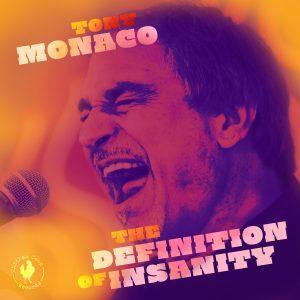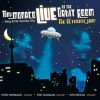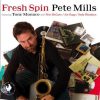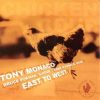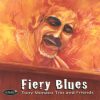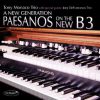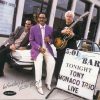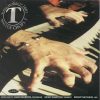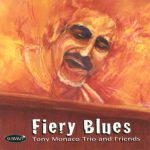The Definition of Insanity – Tony Monaco
You’ll hear it all: Funk and Jams, Latin standards, Italian and Vocal Classics…This Project is a new side of Monaco’s music that explores his latest passions with an incredible band! You’ll hear meticulous playing from drummer Tony McClung and guitarist Derek DiCenzo – the chemistry from playing together often is obvious! This is a real band that knows each other well!
REVIEW:
Did you order it? Somebody ordered the party platter, because B3 maestro Tony Monaco is delivering. His music is for all intents and purposes a celebration. With The Definition of Insanity, a reference to doing the same thing over and over again and expecting a different result, he confesses to be under the influence of the same mania as the legends Jimmy Smith, Brother Jack McDuff, Reuben Wilson, Richard “Groove” Holmes, and Jimmy McGriff. If this man is insane, I say we spread a bit of his madness into these demented times.
Monaco doesn’t stick to a strictly soul-jazz program, but everything he plays here is infused with a profound soulfulness. Opening with a cool run through the Phish tune “Cars Trucks Buses,” his quartet circles the jam-band school with guitarist Derek DiCenzo’s jangly notes and the Orleans swing of drummer Tony McClung. Monaco intends to take us through an assortment of emotions during this party. He shifts into Lee Morgan’s bossa nova with “Ceora,” then pulls the rug out with “Root Down,” which fans of the Beastie Boys will instantly recognize from their recording Ill Communication (Grand Royal, 1994). The music was actually sampled from Jimmy Smith’s 1972 composition “Root Down (and Get It).” Monaco’s version, with the funk spread thick by DiCenzo, give a nod to the Boys, but retains the feel of Smith’s version. Head swimming by now (and it should be), Monaco shifts into the (often considered banal) Italian pop tune “Quando Quando Quando.” Like much of Monaco’s party music, he can inject life into a corny corpse. Even the Grateful Dead’s (imagine Jeffrey Lebowski telling his cab driver, “I’ve had a rough day and I hate the Dead”) “Truckin'” rallies with a certain glint that satisfies both the jazzbo and neo-hippie.
But, it ain’t a party unless Monaco delivers a sermon. Here, we get three vocals by the organist. “Never Let Me Go” adds piano by Asako Monaco, Tony’s wife. The Leon Russell classic “A Song For You” is delivered with Monaco playing some piano then organ, and on the traditional Neapolitan song “Non Ti Scordare Di Me,” he adds accordion to his vocals. Bravo maestro, bravo.
-Mark Corroto for AllAboutJazz.com
REVIEW:
The modern B3 bad boy burner steps outside his comfort zone for lucky Monaco’s 11(th) and cooks away on tunes from quadrants other than his own songbook. A real party time cooker when the blue lights are on in the basement, it makes perfect sense to give Jimmy Smith’s heir apparent your full attention. Totally hot.
-Chris Spector for Midwest Record
REVIEW:
Tony Monaco is a world class Hammond B3 player, mentioned in the same conversation with greats like Jimmy Smith, Jack McDuff, and Shirley Scott. This is his eleventh album as a leader and it’s his most, as the title may suggest, wildly eclectic. Buoyed by a recent recovery from an artery blockage and the birth of his son, Monaco felt like he needed to change it up. Typically, this do-it-all musician offers mostly his own compositions but here he not only mostly covers others but crosses genres and continents in the process. In another departure from his typical repertoire, Monaco plays accordion and piano as well as sings on a couple.
The “do-it-all” mention is because Monaco played, arranged, produced, recorded, mixed and mastered the album. Its pristine sound is a result of his diligent work. Monaco hails from Columbus, OH and brought in some of the region’s top musicians or support. Guitarist Derek Dicenzo (Monty Alexander, Jim Hall, Charlie Byrd), his usual gigging drummer Tony McClung, and his wife, pianist Asako Monaco, all support although Asako appears on just the ballad, “Never Let Me Go,” in tribute to the recent passing of Monaco’s friend, trumpeter Roy Hargrove.
From Phish and Grateful Dead jams to nostalgic Italian standards in homage to his mother, to musical strains from Brazil and Turkey, to tunes from classic jazz composers, Monaco stretches out. It reminds me a bit of a former DJ friend’s comment – “Jazz is not a type of music. It’s a way of playing music.”
He opens with “Cars Trucks Buses,” written by keyboardist Page McConnell of Phish. The tune was written for the B3 and Monaco gives it his signature bluesy flavor, taking it in a lightly different direction. Then he abruptly changes pace with the bossa written by Lee Morgan, “Ceora,” before paying tribute to his idol Jimmy Smith on “Root Down.” You many have noticed there is no bass player aboard,so those bass lines come courtesy of Monaco’s left hand.
We first hear Monaco’s vocals on “Never Let Me Go.” It’s heartfelt as Monaco used to jam on this tune with the late Hargrove. Monaco follows with his up tempo arrangement of a usual gentle Italian love song, “Quando, Quando, Quando” where both he and Dicenzo exchange fiery solos. He sticks with the Italian genre on “Non Ti Scordare Di Me<” one that’s been sung by Luciano Pavarotti and Andrea Bocelli. Monaco provides a jazz interpretation while retaining the traditional elements by playing accordion and singing in Italian.
In yet another twist, Monaco renders the lone original “Awar Athar” with tinges of Middle East motifs. In fact, the term “awar athar” is a Turkish scale that he learned from his Turkish student. He then makes his B3 sound like a pedal steel guitar by cranking up the reverb on the familiar Floyd Cramer country hit, “Last Date.” By this point, the listener realizes that just about any kind of tune is fair game for the talented Monaco.
Given that he opened with a Phish tune, maybe it’s not so surprising to hear a Grateful Dead jam in this mix. Tony has a regular club gig in Columbus dubbed “Monaco Monday.” He attracts a young crowd who often shout out requests. So many of those have been Dead requests that he decided to include “Truckin’”. The drumming of McClung is especially impressive here and although the tone and style are different, one can’t help but to think back to those Garcia-Merle Saunders Keystone sessions.
Monaco then covers Jobim in “Triste” featuring some elegant guitar breaks from DiCenzo, who proves to be versatile throughout. For the close we get the familiar Leon Russell ballad, “A Song For You,” sung by Monaco playing piano for the first time on a recording. He begins unaccompanied but as the choruses evolve, you’ll hear the B3 chording and soloing as well as drums.
This could be as an electic set of tunes on an album that you’ll ever hear, but somehow it holds together coherently due to Monaco’s B3 style and his sensibilities for the tunes.
-Jim Hynes for Making a Scene
REVIEW:
If there is one musical genre I would not have expected to make a comeback, soul jazz would be that one, and that goes double for Hammond B3 soul jazz. Much like cool jazz and bebop, soul jazz seemed terminally connected to the era that spawned it, and the B3 itself became terribly un-hip during the 80s and seemed destined to stay that way. You can thank both England’s acid jazz scene and changing tastes in US commercial jazz radio for opening the door for funky bluesy B3 jazz to return, but not necessarily in a nostalgic way, this music has managed to adjust and sound relevant and hip again. One deserving recipient of this revival is B3organist Tony Monaco who has just favored us with his 11th album as a leader, “The Definition of Insanity”. This is one helluva fun album, and if that sounds too glib or shallow I’m sorry, but I have been listening to this one a lot lately and it never fails to pick me up, it’s a kick and a half.
“The Definition of Insanity” is an extremely eclectic album, yet it all works. Tony usually includes some originals on his albums, but this time he decided to go mostly with covers and just one original, and that’s where much of the eclecticism comes from as Tony takes on tunes from Phish, Lee Morgan, The Grateful Dead, Floyd Cramer and even includes a classic Italian ballad. Tony cites organists Jimmy Smith, Groove Holmes and Larry Goldings as influences, and all that comes through in his flashy blues drenched solos. Along with plenty of classic soul jazz, this album also covers, Latin, Middle-Eastern grooves, country and a couple vocal ballads too.
Some highlights on here include the driving energy of Phish’s “Cars Trucks Buses”, the contemporary groove of Jimmy Smith’s “Root Down” and the Grateful Dead’s “Truckin” which makes for an excellent soul jazz number. On Floyd Cramer’s country classic, “Last Date”, Tony manages to make the B3 imitate a steel guitar. A couple ballads feature Tony’s vocals which may remind some of Willie Nelson, and that is a good thing. There is a lively energy to this entire outing, during my initial listens I just assumed this was a live date, it certainly sounds like one. As I said earlier, this is a ‘fun’ album, and I definitely need something like this in my collection sometimes.
-Jazz Music Archives by John Sanders
REVIEW:
Tony Monaco is named in the same breath as Jimmy Smith, Jack McDuff and Shirley Scott. He is considered one of the Hammond B3 organ players, who knows how to convince through his sense of blues, swing and soul. You can completely convince yourself of this when listening to the latest CD. It is his eleventh published album as a bandleader who has truly climbed the “sky of the Hammond B3”. Instead of recording their own compositions, Monaco decided this time for a rather eclectic mix of well-known songs, including “Ceora”, “Quando Quando Quando” and “Never Let Me Go”.
With Tony Monaco on the current album, the guitarist Derek DiCenzo can be heard, who has accompanied Monty Alexander for years. Dicenzo can also be heard on recordings with Jim Hall and Charlie Byrd. As a drummer Monaco could win Tony McClung , a well-known greats in the jazz scene of Columbus, Monaco’s hometown. His wife, pianist Asako Monaco, is part of the song as well.
The album opens with “Cars Trucks Buses,” written by keyboarder Page McConnell of rock band Phish. It’s a song especially for the B3. Although the rocky piece has little in common with jazz, Monaco manages to give an infusion of blues and jazz grooves. The theme is never intrusive, but rather subterraneously borne by the Hammond B3, which also sometimes draws attention with high registers. The guitar strings whir and whistle bluesy. The rhythm gets in the legs. Behaved percussion vertebrae accompany the game of Monaco and Dicenzo, who skilfully holds dialogue with Monaco. And also a drummer’s solo was interspersed, with and without erratic swirls.
Also on the program is “Ceora”, a boss of the trumpeter Lee Morgan, whom Monaco greatly appreciates. The Bossa is laid out very slowly and the contours and lines are in the hands of Monaco. In addition one hears a constant Ticktick of the drummer. Almost sparkling is the guitar playing Dicenzos. Incidentally, when listening, one thinks of the Blue Hour rather than a “fiery bossa on the Sugar Loaf”.
With “Root Down” Monaco bows to his idol Jimmy Smith. Somehow the title in arrangement and interpretation also seems to be based on the soundtrack of “Shaft” (comp Isaak Hayes). Monaco’s “Root Down” breathes a lot of funk and soul. At the same time one can get an impression of the nimble finger game Monaco, which seems like a berserker with “swipe” the buttons to operate.
“Never Let Me Go” (composed by Jay Livingston / Ray Evans) was written for the 1956 film “The Scarlet Hour”. In this ballad-like piece with “sweet admixture” Monaco can be heard with his slightly soulful voice next to the tender “glass bead play of the piano”. As a pianist, we also hear Monaco’s wife.
“Quando Quando Quando” is an Italian pop song from 1962, played by Monaco in a dashing bossa style. As a soloist, Dicenzo briefly takes center stage in the arrangement and paraphrases the theme, while drums and Hammond organ provide the “rhythmic relining”. With “Non Ti Scordare Di Me”, a traditional song from Naples in three-quarters-time, we stay in Italy again. The melody was sung by Luciano Pavarotti and Andrea Bocelli, among others. Monaco accompanies his own singing with the accordion. It gives the impression of listening to a light opera aria. At the same time, a slow waltz seems present.
Crossover is in “Awar Athar” with an oriental coloring announced. That it does not need Saz or Ud for such a coloring underlines the trio around Monaco sustainable. The guitar playing proves to be very fine, almost performed with a classic attitude. And then, yes, Monaco lives up to its keyboard furniture, makes the keys “strum” and the Orient disappears tonally completely. Obviously, Monaco did not want to miss a pinch of country music when he put the album together. You have to accept that when listening to “Last Date” anyway.
Monaco’s fondness for the harmonies Jobims is reflected in “Triste”, a song that also Frank Sinatra with English poetry in the repertoire had. The band Grateful Dead immortalized Monaco on his album, on which a radio version of “Truckin ‘” can be heard. In addition, Rhythm `n Blues is unmistakable. With another reference to the world of rock and pop Monaco concludes his album. You can hear Leon Russell’s “A Song for You”.
–Jazz Halo by Ferdinand Dupuis-Panther
REVIEW:
There is nothing like the sound of progressive jazz, especially when the sound includes the Hammond B3. Tony Monaco has developed a reputation as a Master of the B3, and he pulls out all the stops on this album, an eclectic mix of songs written by others. Amazingly, all of this great music comes from only a trio of musicians, albeit they are three of the best in the world, including guitarist Derek Dicenzo and drummer Tony McClung. Monaco’s wife Asako, a gifted pianist in her own right, also contributes her talents to “Never Let me Go” while Monaco contributes his vocals. This is truly a class act.
Recommendation: Definitely Get this one if you love jazz.
–Indie Voice by Robert Leggett
If you are interested in purchasing an individual track from this cd, visit ![]()



